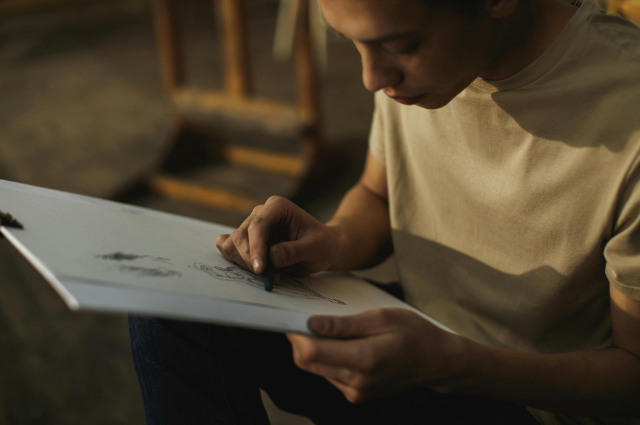
Ravi didn’t plan to end up on a rooftop at sunset.
But then again, nothing had gone as planned in a long time.
He leaned against the railing, the metal warm under his fingers, and watched the city stretch below, layers of grey buildings, honking horns, tea vendors yelling orders, kids chasing each other with plastic bottles. Life was pulsing in every direction, and yet Ravi felt strangely still.
Not lost. Not anymore. Just quiet.
It had been nearly two years since the collapse.
Not just of his startup, but of himself.
At 29, Ravi had been co-founder of a tech startup that, for a moment, seemed like it could change everything. They had the app, the pitch deck, the seed funding, the late-night coding marathons. Everyone said, You guys are onto something.
Even his sceptical relatives in Pune had begun to say his name with pride.
Then came the unravelling.
His co-founder, once his best friend, vanished one night—with most of the funding and a hastily deleted LinkedIn account. Investors pulled out. Lawsuits whispered at the edges. Employees left, disappointed and angry. And amid the storm, Ravi’s father died of a heart attack.
He missed the call from the hospital.
And that guilt—that was the anchor.
Everything else crumbled, but that stayed. Heavy. Constant.
He left Bengaluru quietly and returned home to Pune. Moved back into his childhood room, where glow-in-the-dark stars still clung to the ceiling and textbooks sat untouched on a dusty shelf. His mother, ever gentle, didn’t ask questions. She simply made him tea each morning and left the cup outside his door.
He didn’t drink it most days.
Depression doesn’t always scream. Sometimes it just numbs.
Ravi slept too much—or not at all. Meals were skipped or eaten mindlessly. The phone rang, and he let it. Friends reached out at first. Then less. Then not at all.
One afternoon, while aimlessly swiping through his gallery, he paused.
It was a photo of a sketch—an old pencil portrait he had done of his mom, catching her mid-laughter while she cooked. There was warmth in her face, motion in her eyes. He remembered how alive it felt to draw that.
He stared at the photo for a long time.
That night, for the first time in months, he opened a drawer and pulled out a forgotten sketchbook. The pages were yellowed at the edges, the pencil inside dull.
Still, he sat at his desk and started sketching. Slowly. Hesitantly.
His hands remembered more than he thought.
It wasn’t perfect.
But it was something.
He drew again the next night. And the next. Faces from memory. His father, from that last photo they took together. A tea seller near the old theatre. A child from the park with two missing teeth and a balloon.
Each line steadied him a little more.
Eventually, he posted a sketch online. No captions, no hashtags. Just an image.
To his surprise, someone messaged him the next day.
Can you make one of my daughter? It’s her birthday next month.
He hesitated. He wasn’t sure he was ready to create for others again. But something inside him stirred—curiosity, maybe. Hope?
He said yes.
That one turned into five. Then ten.
Soon, he was receiving orders regularly—portraits of lost pets, wedding gifts, family memorials.
People wanted him to capture what they couldn’t put into words.
Each sketch was more than art.
It was a conversation. A connection. A step.
He named the account PencilDust. Quiet, unassuming. But it grew. Slowly. Organically. No PR. No hashtags. Just word-of-mouth and authenticity.
Ravi found rhythm again—not the manic pace of startup life, but a steady, breathing rhythm.
Draw. Deliver. Drink tea. Walk. Repeat.
Some nights, the old ache returned. The guilt. The failure. The image of his father’s last missed call.
But now, he didn’t bury it.
He’d take out his sketchbook and draw through it.
Let the grief become lines, shading, form.
One afternoon, while walking to buy groceries, a kid from the neighborhood tugged at his shirt.
“Are you the drawing uncle?” he asked, eyes wide.
Ravi laughed for the first time in what felt like months.
“Yeah, I guess I am.”
“You should teach us! I want to draw my dad.”
That night, the idea wouldn’t leave him. So he posted on a local WhatsApp group:
Free sketch circle. Sundays. Park near Krishna Temple. Bring your own pencils. All ages welcome.
The first Sunday, three kids showed up.
Then seven.
Then, a couple of elderly women.
By the end of the month, they had a tarp spread across the grass, dozens of sketchbooks, and the sound of people creating without fear.
It was beautiful chaos.
One morning, he got a call from a local NGO asking if he’d teach art once a week at a shelter for girls.
He agreed instantly.
There, among scarred hearts and bright laughter, Ravi found something he never had in tech, in funding rounds, in product launches.
Purpose.
It wasn’t about climbing anymore.
It was about growing.
Quietly. Grounded. Real.
And that rooftop?
That wasn’t about giving up.
That was about looking back at the rubble, the rebuilding, and everything in between.
As he stood there, the wind in his hair, the orange sky setting the buildings on fire, he felt peace, not perfection, not success, not resolution.
But peace.
“Sir, is everything alright?” a security guard called from behind.
Ravi turned and nodded.
“Everything’s fine,” he said with a smile.
“Just wanted to see how far I’ve come.”
Moral?
You won’t always rise the way you imagined. But sometimes the fall brings you to something more honest, more human, more yours. And when that second life starts, it’s quieter, but it’s true. The climb back up doesn’t have to be fast. It just has to be real.
